
The Enduring Strength of Empathy: Mariska Hargitay, Olivia Benson, and the Power of Listening
For over two decades, Mariska Hargitay has inhabited the skin of Olivia Benson, the unwavering, compassionate, and relentlessly determined detective and now Captain of the Special Victims Unit in the long-running television series, Law & Order: Special Victims Unit. While Benson began as a fierce protector of victims, navigating the treacherous waters of the justice system with unwavering conviction, her journey, mirrored by Hargitay’s own commitment to advocacy, has transformed her into something far more profound: a symbol of hope, healing, and the enduring power of empathy. More than just a fictional character, Olivia Benson has become a beacon for survivors of sexual assault, and Mariska Hargitay, the actress who breathes life into her, has used her platform to amplify the voices often silenced by trauma, transforming a television role into a powerful force for social change.
Hargitay’s initial connection to the role was, in part, informed by a personal tragedy – the loss of her mother, actress Jayne Mansfield, at a young age. This experience, though different in nature, fostered within her a profound understanding of loss and the need for healing. This sensitivity, coupled with her natural charisma and dedication, quickly resonated with audiences. Early episodes of SVU established Benson as a detective deeply invested in her work, driven by a fierce moral compass and a determination to bring justice to victims. Hargitay skillfully portrayed Benson's anger and frustration, but also her unwavering commitment to listening to the survivors, offering them a safe space to recount their experiences.
However, it was Hargitay's deliberate choice to move beyond the confines of simple crime drama that truly cemented Benson's legacy. She understood the responsibility that came with portraying a character who dealt with such sensitive subject matter. She immersed herself in research, consulting with experts in the fields of sexual assault and domestic violence. This dedication led her to found the Joyful Heart Foundation, an organization dedicated to healing, educating, and advocating for survivors. In a 2017 interview with Marie Claire, Hargitay stated, "Olivia has given me a purpose, and I think that's one of the reasons I've stayed with her for so long. It's not just a job, it's a mission."
This mission has deeply impacted the portrayal of Olivia Benson. Over the years, Benson has evolved from a driven detective to a more nuanced and empathetic leader. Hargitay has masterfully depicted Benson's own struggles with secondary trauma, allowing audiences to witness the emotional toll that such harrowing work can take. This vulnerability, this willingness to show the character's cracks and imperfections, has made Benson even more relatable and authentic. She is not a superhero, but a human being grappling with the complexities of a broken system, striving to make a difference in a world often resistant to change.
Hargitay’s influence extends beyond the fictional world of SVU. She has become a vocal advocate for policy changes and improved resources for survivors. She has testified before Congress, lending her voice to the fight against sexual assault and domestic violence. By using her platform to raise awareness and challenge the stigma surrounding these issues, Hargitay has empowered countless individuals to come forward and seek help. She understands that representation matters, and she has used her role as Olivia Benson to create a space for survivors to feel seen, heard, and believed.
One of the most compelling aspects of Hargitay’s portrayal is her emphasis on the importance of listening. Olivia Benson doesn't just investigate crimes; she listens to the stories of the survivors, validating their experiences and empowering them to reclaim their lives. Hargitay has consistently emphasized the power of believing survivors, acknowledging the immense courage it takes to speak out and demanding accountability from those who perpetuate violence. This unwavering support has transformed Olivia Benson from a fictional character into a symbol of hope for countless individuals who have been affected by sexual assault.
In conclusion, Mariska Hargitay's portrayal of Olivia Benson has transcended the limitations of television. Through her unwavering commitment to authenticity, empathy, and advocacy, Hargitay has created a character who resonates deeply with audiences and inspires real-world change. Olivia Benson is not just a detective; she is a symbol of resilience, hope, and the transformative power of listening. Mariska Hargitay’s dedication to the role, coupled with her tireless work through the Joyful Heart Foundation, has transformed a television show into a powerful platform for social justice, reminding us that even in the darkest corners of humanity, compassion and empathy can shine a light on the path to healing. The enduring strength of Olivia Benson, embodied by the talented and dedicated Mariska Hargitay, serves as a testament to the power of storytelling to inspire positive change in the world.
